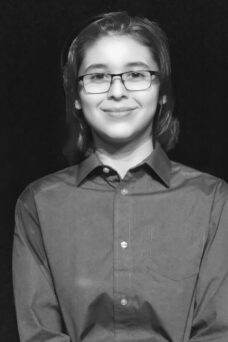Graduation Spotlight: Sam Gay, Performance Studies
Sam Gay’s path at Texas A&M University began with math, but quickly shifted to performance studies as the COVID-19 pandemic hit in 2020.
“It was at that time that people were putting more focus on artists, and how in times of need or bad times that art is the thing that prevails and helps people through it,” said Gay, whose pronouns are they/them. “That really just spoke to me.”
Gay enjoyed one particular course that year: Evolution of the American Musical, taught by Dr. Kim Kattari, associate professor and program director for the performance studies Bachelor of Arts degree. “So I looked up what department she was in and switched my major,” they said.
Now Gay will be honored as a distinguished student at a Friday afternoon graduation ceremony for the College of Performance, Visualization and Fine Arts at Geren Auditorium, then walk the stage later that night at Reed Arena.
The major allowed Gay to explore mental health issues in a variety of ways, saying it differs from other areas of study in that it’s not “just throwing information at you and praying you memorize it.”

“Performance studies is something where, if you’re passionate about something, focus on it,” Gay said. “It will make the whole major worth it. I was focusing on mental health because I’m also a psychology minor. That really interested me, and so I would use art to explore that. It’s a very open field and it’s one I’m really grateful to have had.”
Gay examined how it feels to have ADHD in a freshman year project by using an internal monologue. Another project titled “I’m Sorry” addressed grief and anxiety through a character calling an answering machine.
“The premise that you learn later in the performance is my character is calling the answering machine of her partner who died, but can’t let that go yet,” Gay said. “So the character keeps calling. The framing device is that the person on the other end is the answering machine, and I queued them — any time I asked a question as this character, they had to respond with ‘I’m sorry’ and nothing more.”
Gay’s career goals include becoming a voice actor, which became a fascination in childhood with behind-the-scenes clips of how voices in animated movies are recorded. It’s an option discovered through exploring the performance studies courses and working podcasts into projects.
“I thought I wanted to do stage acting,” Gay said. “While I enjoyed it, it was also stressful for me. It was stressful having to think of my entire body, including my voice, as something I have to manage on the stage. Voice acting was something I realized could be a lot more fun because I don’t have to worry about my physicality, or how my face is emoting, as long as I’m getting it across in my words.”
Voice acting inspired Gay’s senior capstone project, described as “a little like a Ted Talk.” The framing device is a research presentation about how to get into the voice acting industry. Gay said it sparked some concerned reactions from those who saw it, but it was all part of the performance.
“Because I do so much work about anxiety and mental illness, it’s something I started expecting,” Gay said. “I had people genuinely worried I had broken down in front of them, or was going off script, when in fact it was part of the script. It was rehearsed.
“Doing productions about anxiety and heavier issues does typically lead people to be like, ‘Are you OK?’ And I’m like, ‘No, no, no, this was how I got it out.’ I use performance as catharsis. Getting it out during that performance meant that it wasn’t something that I had to carry with me later.”
As graduation arrives, Gay credits the professors in the performance studies program for their guidance and support. “They were so good about caring for the students,” they said.
“The amount of time — especially over COVID — that my professors would take a moment and say, ‘OK, the room feels tense,’ or ‘It’s that time of year, it’s gonna be stressful,’ and just take time to do breathing exercises with us,” Gay said. “There was something that was so nice about that, the fact that professors would read the room and take a moment to get stressors out before continuing. It’s something that was really impactful for me.”